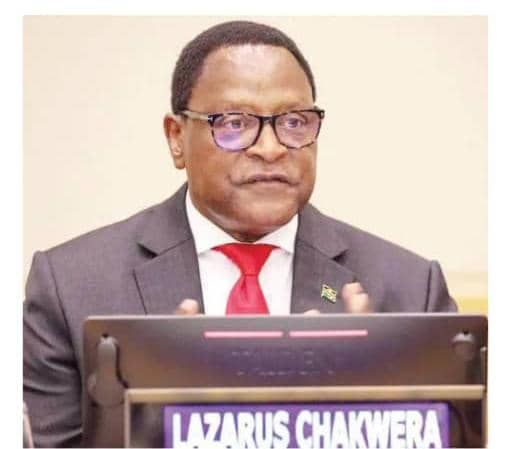By Burnett Munthali
In a series of bold moves that have drawn comparisons to the presidency of Donald Trump, Malawian President Lazarus Chakwera has recently signed a number of executive orders that signal a significant shift in the country’s governance and policy. These executive actions, some of which are highly controversial, touch on key areas of national concern, including the management of public services, corruption, and the country’s approach to critical sectors such as agriculture.
One of the most significant orders issued by President Chakwera is the termination of a marine services concession agreement with Mota Engil, a Portuguese company that had been providing services under a long-term agreement. This concession, which covered essential operations at Malawi’s ports and marine infrastructure, is now being handed over to Malawi Lake Services, a state-owned entity. The decision to terminate the agreement with Mota Engil has sparked a wave of debate, with some praising it as a necessary step to ensure that the management of Malawi’s marine services remains within the control of Malawians. However, others have questioned the timing and the potential consequences of such a drastic move, particularly in terms of the impact it may have on the country’s trade and international relations.

Chakwera’s move to reclaim control of the country’s marine services aligns with his broader vision for economic self-reliance and reducing foreign influence in key sectors of the economy. The changeover to Malawi Lake Services is expected to bring operational efficiencies, but the transition is expected to be closely scrutinized. Questions remain about the capacity of the state-run entity to take on the responsibilities previously held by a private foreign company, as well as the potential for delays and inefficiencies that may arise as the new management takes over.
Another significant executive decision made by Chakwera involved rejecting a written request from former presidential guard Norman Chisale, who had been seeking the president’s intervention to unfreeze his funds and properties. Chisale, a figure linked to multiple corruption scandals during the previous administration, had reportedly requested that Chakwera issue an order to reverse the freezing of his assets, which had been implemented as part of an ongoing investigation into his financial activities. In rejecting the request, Chakwera sent a strong message that his administration would not tolerate corruption or allow any individual, regardless of their past connections, to escape accountability.
Chisale’s request to unfreeze his assets was seen by many as an attempt to leverage political influence to sidestep legal processes. By refusing to grant such a request, Chakwera has reinforced his commitment to fighting corruption and upholding the rule of law in Malawi. This move is in line with his broader anti-corruption agenda, which has been a cornerstone of his presidency. The rejection of Chisale’s request signals that the Chakwera administration intends to hold individuals accountable for their actions, irrespective of their political affiliations or past positions of power.
The third notable executive order issued by Chakwera concerns the procurement of fertilizer for Malawi’s agricultural sector. In a move aimed at curbing corruption and ensuring better management of public resources, the president has decided that fertilizer procurement will henceforth be done on a Government-to-Government (G2G) basis, rather than through the private sector. This decision is expected to have a profound impact on the agricultural landscape in Malawi, where access to affordable fertilizer is a critical factor in ensuring food security and supporting the livelihoods of millions of farmers.
By shifting fertilizer procurement to a G2G model, Chakwera seeks to eliminate the middlemen who often drive up costs and introduce inefficiencies into the supply chain. The decision is also likely to have significant political implications, as it could disrupt long-standing contracts and relationships with private suppliers who have previously been the beneficiaries of government tenders. While the move is likely to improve transparency and accountability in the procurement process, it could also face resistance from entrenched interests within the private sector.
These executive orders come at a time of increasing public dissatisfaction with the country’s political elites and a growing demand for change in the way Malawi’s resources are managed. Chakwera, who campaigned on a platform of reform and governance improvement, has sought to demonstrate that he is willing to take decisive action to address the country’s long-standing challenges. His executive orders, while controversial, reflect a clear determination to bring about change, even if it means upsetting the status quo.
However, the impact of these orders remains to be seen. The transition of marine services to Malawi Lake Services will undoubtedly face challenges, especially in terms of ensuring that the state-run entity has the capacity to manage such a critical sector. The rejection of Norman Chisale’s request is likely to be seen as a victory for anti-corruption efforts, but the public will be watching closely to see whether the administration follows through on its promises of accountability. The shift to Government-to-Government fertilizer procurement will likely face pushback from private sector actors, who may seek to challenge the new model in the courts or through political pressure.
Ultimately, Chakwera’s executive orders represent a significant turning point in Malawi’s governance and policy landscape. Whether these decisions will lead to lasting change or create further challenges for the president’s administration will depend on how effectively they are implemented and how the public and political actors respond. As Malawi moves forward, the eyes of the nation will be focused on Chakwera’s leadership to ensure that these bold actions result in tangible benefits for the people of Malawi.


